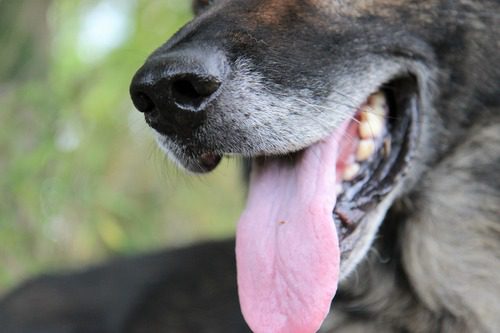Why Does My Dog’s Breath Smell Like Fish?

Have you noticed that your dog’s breath smells like fish? While dog breath isn’t expected to be minty fresh, an overwhelming fishy odor can be concerning. Many pet owners wonder why their furry friend’s breath suddenly takes on such an unpleasant scent. The truth is, several factors can contribute to this issue, and some may require veterinary attention. In this blog, we’ll explore the common reasons behind fishy-smelling dog breath and when it’s time to contact Yalesville Veterinary Hospital.
Common Causes of Fishy Dog Breath
Several potential culprits can explain why your dog’s breath smells like fish.
Dental Disease and Poor Oral Hygiene
One of the most frequent causes of bad breath in dogs is dental disease. Plaque and tartar buildup create an environment where bacteria thrive, leading to gingivitis, periodontitis, and tooth decay. When bacteria break down food particles in the mouth, they release foul-smelling compounds, which can sometimes mimic the scent of fish. Signs of dental disease in dogs include:
- Persistent bad breath
- Red or swollen gums
- Yellow or brown tartar buildup on teeth
- Drooling or difficulty chewing
- Pawing at the mouth
If your dog’s breath smells like fish and you notice these symptoms, schedule a professional dental cleaning at Yalesville Veterinary Hospital. Regular brushing and dental chews can also help maintain fresh breath.
Anal Gland Issues and Their Connection to Breath Odor
Although it may seem unrelated, fishy-smelling breath can stem from anal gland problems. Dogs have two small sacs near their rectum that secrete a fishy-smelling fluid. Normally, these glands empty during bowel movements, but if they become impacted or infected, dogs may lick the area excessively, transferring the odor to their mouth. Signs of anal gland issues include:
- Scooting on the floor
- Excessive licking of the rear
- A strong fishy smell
- Discomfort while sitting
If you suspect anal gland problems, your veterinarian can manually express the glands and check for infection. Regular vet visits can help prevent future issues.
Diet and Gastrointestinal Issues
Your dog’s diet plays a significant role in their overall health, including their breath. Some commercial dog foods contain fish-based ingredients or omega-3 fatty acids, which can leave a lingering fishy smell in your dog’s mouth. Additionally, dietary imbalances or digestive issues can contribute to bad breath. Gastrointestinal problems such as acid reflux or an imbalance of gut bacteria may also cause foul-smelling breath. If your dog frequently has fishy breath along with symptoms like vomiting, diarrhea, or excessive gas, consult your veterinarian to rule out digestive concerns.
When Should You Be Concerned?
While occasional bad breath may not be a cause for alarm, persistent fishy breath can indicate an underlying health problem. If your dog’s breath smells like fish and is accompanied by other symptoms, a veterinary visit is the best course of action.
Signs That Warrant a Vet Visit
- Persistent or worsening bad breath
- Signs of dental disease (swollen gums, loose teeth, tartar buildup)
- Excessive licking or scooting
- Changes in appetite or difficulty eating
- Vomiting, diarrhea, or other digestive issues
Your veterinarian will perform a thorough examination to determine the cause of the odor and recommend the appropriate treatment.
Preventative Measures for Fresh Dog Breath
Taking proactive steps can help reduce the likelihood of your dog developing fishy-smelling breath. Incorporating good dental hygiene, a balanced diet, and routine veterinary care can make a significant difference.
Prioritizing Dental Health
- Brush your dog’s teeth regularly using pet-safe toothpaste.
- Provide dental chews or toys that help reduce plaque buildup.
- Schedule professional dental cleanings with Yalesville Veterinary Hospital as needed.
Maintaining Anal Gland Health
- Ensure your dog has a high-fiber diet to promote natural anal gland expression.
- Monitor for signs of discomfort and have your vet check the glands regularly.
- Avoid excessive self-licking, which can transfer the odor to their breath.
Feeding a Balanced Diet
- Choose high-quality dog food with appropriate nutrient levels.
- Avoid excessive fish-based treats if they contribute to the odor.
- Provide fresh water daily to support hydration and overall health.
If your dog’s breath smells like fish, it’s important to identify the cause and take the necessary steps to address it. Whether the issue stems from dental disease, anal gland problems, or dietary factors, a veterinarian can help determine the best course of action. Yalesville Veterinary Hospital is here to help keep your pet healthy and happy. Call (203) 265-1646 or book an appointment online today to ensure your dog’s breath and overall well-being stay in top shape.
